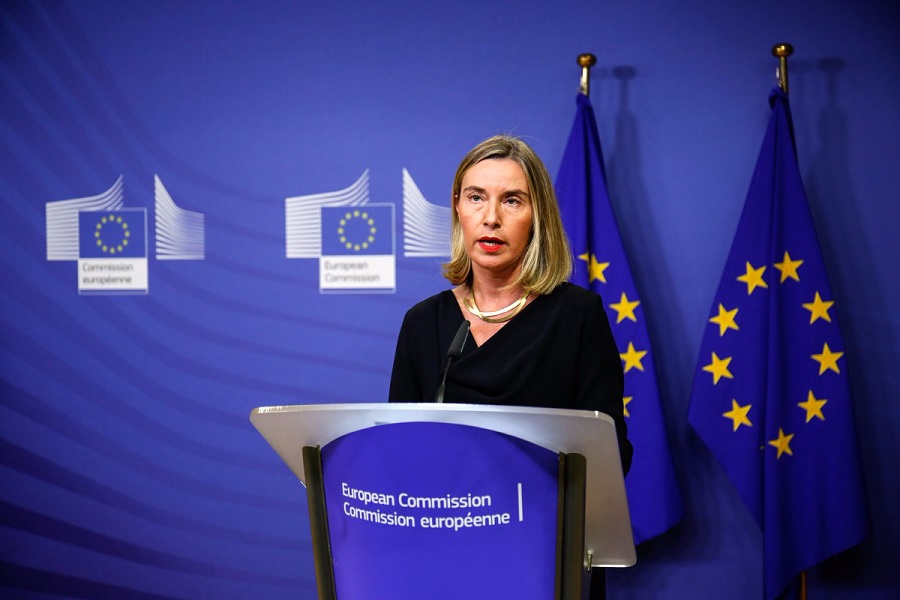Q&A:
Q. Can Mr Trump terminate the deal? You just said he cannot, he just said he can. Which one of you is right? Can you explain that to us? And secondly and crucially, if Mr Tillerson comes to you in January or February after a change in the US law – if that happens – and says, “let’s work on a successor separate agreement dealing with ballistic missiles and sunsets in the agreement or Mr Trump will kill this deal”, what will you say to him?
I just spoke to Secretary [of State of the United States of America, Rex] Tillerson and that was not part of our conversation.
I do not need to explain to you who know the agreement very well. This deal is not a bilateral agreement. This is not an international treaty. This is an annex, a very long annex, to a UN Security Council Resolution, unanimously adopted.
To my knowledge, there is not one single country in the world that can terminate a UN Security Council Resolution that has been adopted, even more so, unanimously, that has been implemented and verified, and that the rest of the international community continues to support and to implement.
It is clearly not in the hands of any president of any country in the world to terminate an agreement of this sort. Because this a UN Security Council Resolution. This is a plan of action that sets things to be done, nuclear-related commitments – and only nuclear-related commitments – and that is being implemented.
So, the President of the United States has many powers, not this one.
In the future, I believe – as I said – the rest of the international community, and for sure the European Union, will preserve the agreement.
Can anything else be negotiated? I guess someone who has experience as a deal-maker knows that to make a deal, you need to have an interlocutor who is interested and ready to negotiate to get to an agreement. And you should ask this question in Tehran right now.
For the moment, this agreement is working, has been implemented, continues to be implemented and I – not only as the High Representative of the European Union, but also as the one who has the responsibility to continue to oversee the implementation of the agreement in place – would expect all to continue to stick to it, as it has been now the case for almost two years.
Q. Mr Trump a eu des mots très durs contre l’Iran tout à l’heure, en disant que c’était un pays qui soutenait le terrorisme, c’est un pays fanatique, une dictature. Pouvez-vous expliquer aux européens pourquoi c’est quand-même bien d’avoir un accord avec ce pays? Et dans le contexte de ce qui se passe avec la Corée du Nord, quelles conséquences peut avoir la décertification de cet accord aujourd’hui?
Premièrement, je voudrais souligner le fait que le discours du Président [des Etats-Unis, Donald] Trump ouvre un processus de politique interne très clair aux Etats-Unis qui commence et dont l’impact devra être – comme je l’ai dit – évalué par la suite.
C’est maintenant au Congrès de décider ou non si la position des Etats-Unis change. Mais, comme je l’ai dit, l’accord n’est pas entre les mains des Etats-Unis.
Sur la qualification de l’Iran, votre question me semble un peu étrange, parce que c’est exactement quand il y a un problème qu’il faut trouver un accord pour le gérer. S’il n’y avait pas de problèmes, on n’aurait pas négocié pendant 12 ans, on n’aurait pas travaillé pendant des mois, des nuits, des semaines. [Ce qui nous a conduit à] terminer les négociations le 14 juillet -le jour de la fête nationale française-, en détaillant par écrit, de manière extrêmement précise, tous les engagements nucléaires à respecter.
C’est exactement pour cause d’un manque de confiance que l’on a détaillé tellement le contenu de l’accord, et c’est pour cela que l’accord fonctionne. Parce que l’on n’a pas basé cela sur la confiance, qui n’était pas là, mais sur la précision des accords et des engagements mutuels.
Et je voudrais rajouter que c’est justement parce que l’on a négocié pendant 12 ans les détails techniques – et pas seulement techniques – de l’accord, en profondeur, que penser rouvrir ou renégocier une partie ou autre de l’accord signifierait rouvrir complètement l’accord; ce qui voudrait dire que l’accord ne serait pas en place.
Je ne vois pas du tout la possibilité de rouvrir ou négocier une partie ou une autre de l’accord. Il n’y aurait pas l’espace politique, il n’y aurait pas l’intention politique du reste de la communauté internationale de faire cela.
* * * * *
Zdroj: https://eeas.europa.eu/headquarters/headquarters-homepage/33922/remarks-high-representativevice-president-federica-mogherini-latest-developments-regarding_en
Ilustračné foto: https://twitter.com/eu_eeas/status/919114177469407232/photo/1








